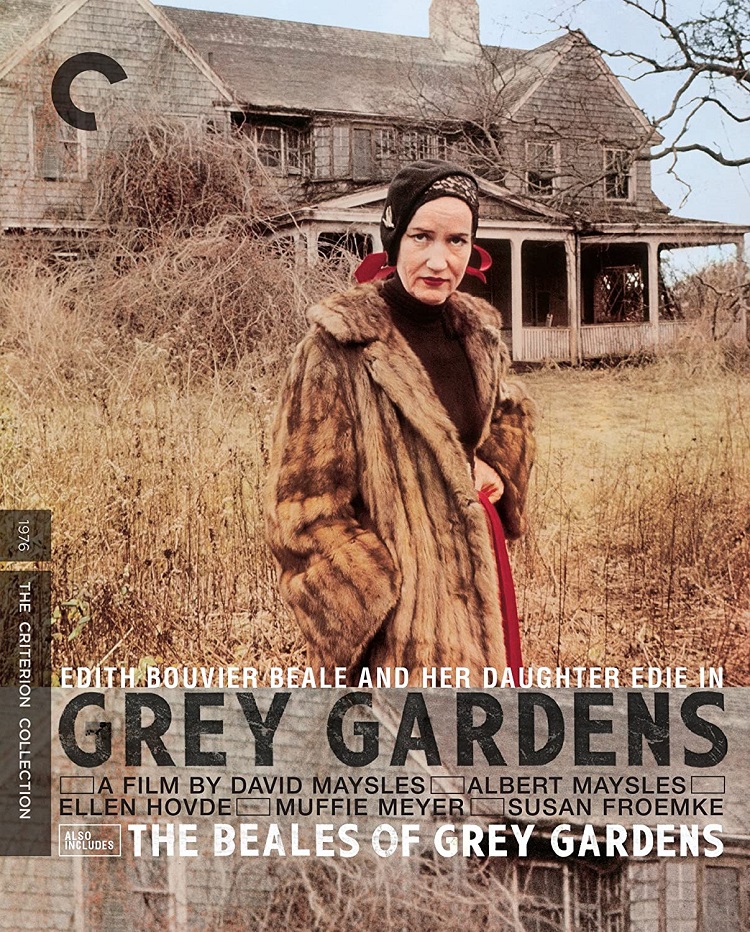
The Film
A landmark in documentary filmmaking and possibly the most well known work from the school of direct cinema, the Maysles Brothers’ Grey Gardens is fascinating, hilarious, disturbing and uncomfortable. It’s about as incisive a portrait as you could get of crumbling aristocracy, but it’s even more remarkable as a deeply empathetic, humanist picture of living life in the face of crushing disappointment.
The subjects — mother and daughter duo Big and Little Edie Beale, reclusive cousins of Jackie Onassis — are irresistible, and Little Edie’s unabashed showmanship for the camera has understandably made her a cult icon. The Maysles’ nuanced, inclusive portrayal doesn’t single out the Beales’ deeply ingrained eccentricities or their thoroughly codependent relationship or the squalid domestic horrors or the moments of pure pleasure the duo derives from a song or a pint of ice cream. All of these things coexist, elevating the film’s effect above mere voyeuristic thrills or the condescension of feigned concern.
As their once opulent mansion in East Hampton grows more dilapidated daily, the grounds overrun by cats and raccoons, which Little Edie feeds in the attic with loaves of Wonderbread and cat chow, the mother and daughter engage in a series of almost ritualized conversations. Emotions vacillate between extreme irritation and breathless affection as Little Edie, in a perpetual state of arrested development, recalls the romantic relationships she missed out on and the life in New York City she couldn’t have because of her mother.
Albert Maysles’ intuitive, highly aware camera work captures the proceedings with astonishing intimacy. Little Edie clearly enjoyed the company of the brothers; her impromptu dance routines and songs feel like paeans to the filmmakers as much as they do the natural outgrowth of her outsized personality. There’s no sense of artificial distance here from the Maysles; Albert will catch himself shooting in the mirror while David records sound, and the existence of those shots in the finished product communicates distinct ideas about what documentary film owes to its viewers and its subjects.
The Blu-ray Disc
Grey Gardens is presented in 1080p high definition and its original 1.33:1 aspect ratio. Sourced from a new 2K digital restoration, this is a gorgeous transfer, one of the greatest I’ve seen for a 16mm film. The large grain structure of the format is beautifully resolved, never looking like noise, and the vibrancy of color and depth of detail markedly improves over the DVD in every shot. This consistently looks like a projected, pristinely clean 16mm film print. The uncompressed monaural soundtrack is crisp and clean throughout.
Special Features
The big extra here is Criterion’s inclusion of The Beales of Grey Gardens, the 2006 follow-up that consists of unused footage from the original shoot 30 years prior. The film was originally a standalone DVD release from Criterion; it’s not much improved here picture-wise, as the DVD transfer has simply been upscaled to 1080i. Still, for those who don’t own the DVD release, it’s a great bonus. It also comes accompanied by an introduction from Albert Maysles.
The rest of the extras replicate those on the Grey Gardens DVD. An audio commentary by Albert Maysles, co-directors Ellen Hovde and Muffie Meyer and associate producer Susan Froemke details the production and editing processes, and offers quite a bit of additional biographical info about the Beales. Audio excerpts from a 1976 interview offer more insight into Little Edie. Fashion designers Todd Oldham and John Bartlett discuss the film’s sartorial influence. The disc also includes a number of behind-the-scenes photos and several trailers. Rounding out the package is an insert with an essay by critic Hilton Als.
The Bottom Line
An added film and a greatly improved transfer make Criterion’s Grey Gardens Blu-ray a very worthy upgrade.